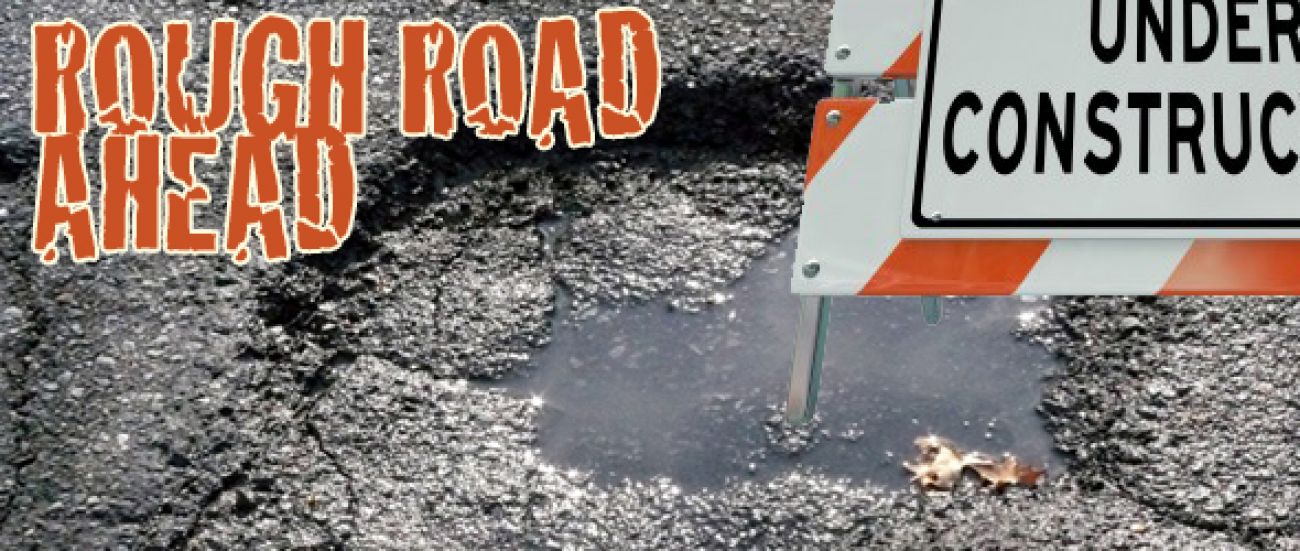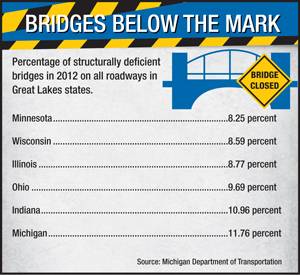Who's to blame for Michigan's road woes?

There is no shortage of fancy electronic charts, graphs and statistics to document the crumbling state of Michigan's streets and highways.
Grand Rapids auto repair shop owner Jay Ziomkowski, though, charts it by the customers who walk through his door.
He recalled a recent winter, when “the roads were just horrific. Certain sections were like a bomb went off. You would get bent rims, blown tires. The struts would actually break off where they were mounted.”
Of course, from his perspective, that might not be all bad.
“I don't mind. It brings work. We do a ton of wheel bearings and I think that's related to the condition of the roads.”
For nearly everyone else, however, there is a price to pay for a state transportation grid in decline.
Numbers show what drivers know
 According to a 2011 state report, 13.6 percent of 85,000 lane miles on roads eligible for federal funding needed structural repair in 2004. By 2011, that figure had more than doubled to 35.1 percent.
According to a 2011 state report, 13.6 percent of 85,000 lane miles on roads eligible for federal funding needed structural repair in 2004. By 2011, that figure had more than doubled to 35.1 percent.
In 2004, nearly 88 percent of those roads were considered in good or fair shape, according to the Michigan Transportation Asset Management Council. That declined to 64.9 percent by 2011.
Michigan has another 80,000 miles of roads not eligible for federal aid, mostly streets and little-traveled rural roads. The news there is no better.
Of some 10,000 miles of such roads that were rated, 44 percent were in poor condition, 46 percent in fair and just 10 percent in good condition.
Michigan annually pops up near the top of lists that only confirm what frustrated drivers often say.
In 2010, Michigan's roads were ranked second worst in the nation by trucking publication Overdrive Magazine. In 2009, they rated third worst.
In 2009, the American Society of Civil Engineers in Michigan gave Michigan roads a grade of “D” and state bridges a “C.” It also noted that some 10,000 miles of primary roads slid from “good” to “fair” condition between 2004 and 2007.
According to the Michigan Department of Transportation, the condition of the state's 10,000 bridges showed slight improvement from 2004 to 2011.
But it also noted that Michigan topped another dubious list, leading Great Lakes states in 2012 in percentage of structurally deficient bridges on all roadways with 11.8 percent.
At Capitol, calls for new funding
 Gov. Rick Snyder is calling for an extra $1.2 billion in annual transportation funding. That could be could be raised through legislation to install a wholesale gas tax and increase registration fees or a voter referendum to increase the state sales tax by 2 cents. Both options would scrap the 19-cents-per-gallon tax paid at the pump.
Gov. Rick Snyder is calling for an extra $1.2 billion in annual transportation funding. That could be could be raised through legislation to install a wholesale gas tax and increase registration fees or a voter referendum to increase the state sales tax by 2 cents. Both options would scrap the 19-cents-per-gallon tax paid at the pump.
Snyder also has proposed a local option under which counties could approve additional vehicle registration increases to fund local road improvements. Michigan has about 120,000 miles of paved roadway, including nearly 10,000 miles of state trunkline, 90,000 miles of county roads, and just over 20,000 miles of city and village streets.
The added funds are to compensate for a decade of declining revenue to fix roads and bridges.
Fuel efficiency disrupts repair system
As cars get more fuel efficient, revenue from the gas tax – the primary funding source for transportation infrastructure - declined from more than $940 million in fiscal year 2002-2003 to $846 million in fiscal 2008-2009. According to the Michigan Senate Fiscal Agency, the amounts to a drop of 42 percent when adjusted for inflation. It calculated that overall transporation transportation revenue, including vehicle license and registration fees, the gas tax and 15-cent diesel fuel tax, declined by 39 percent allowing for inflation during that period.
At the same time, the cost of everything from asphalt to paving trucks has only gone up.
“It's extremely frustrating,” said Jon Rice, managing director of the Kent County Road Commission.
“We've got a huge investment (in roads and bridges) in Kent County and to see that investment deteriorate and knowing that we can't do what the public expects us to do is very frustrating.”
Rice said the county netted $29 million in state transportation fund revenues for fiscal 2012 -- same amount it received in 1999. Adjusting for inflation, that represents a funding drop of $11 million. Rice estimated during that same period that basic maintenance costs increased by at least 80 percent.
The cost to road quality has been considerable. In 2004, 18 percent of county roads were rated in poor condition. That nearly doubled to 35 percent in 2010.
“As the years go on, the deterioration keeps getting ahead of us,” he said.
In the long run, that means it will cost even more to upgrade roads to acceptable standards. MDOT estimates the cost of returning a poor road to good condition is four to five times greater than the cost of returning a fair road to good condition.
And the price paid by the motoring public is more than a bone-jarring ride. Michigan transportation officials estimated in 2009 that bad roads cost state motorists $370 a year in extra vehicle operating expenses. Business advocates say it costs millions of dollars more in added expenses to the manufacturing and agriculture sector while undermining growth in tourism.
State officials say that if funding remains static, it will cost $25 billion in added repair bills over 10 years for the state road system.
MDOT Director Kirk Steudle compares road and bridge maintenance to the basic hygiene needed to keep a set of teeth. Neglect either and the result is not pretty.
“You are born with a nice set of teeth, but if you don't brush them and go to the dentist, when you get to about 40, you can go get a new set of teeth.”
Business Watch
Covering the intersection of business and policy, and informing Michigan employers and workers on the long road back from coronavirus.
- About Business Watch
- Subscribe
- Share tips and questions with Bridge Business Editor Paula Gardner
Thanks to our Business Watch sponsors.
Support Bridge's nonprofit civic journalism. Donate today.
See what new members are saying about why they donated to Bridge Michigan:
- “In order for this information to be accurate and unbiased it must be underwritten by its readers, not by special interests.” - Larry S.
- “Not many other media sources report on the topics Bridge does.” - Susan B.
- “Your journalism is outstanding and rare these days.” - Mark S.
If you want to ensure the future of nonpartisan, nonprofit Michigan journalism, please become a member today. You, too, will be asked why you donated and maybe we'll feature your quote next time!

